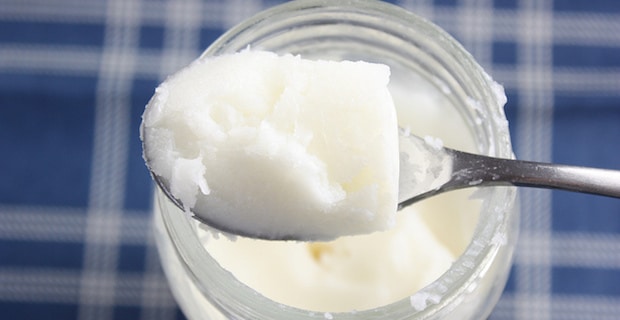
Supermodel Miranda Kerr recently credited coconut oil as one of her beauty secrets, sending sales of the healthy oil soaring in the UK. The Victoria’s Secret angel says that she uses it daily in her cooking and applies it topically to her skin and hair.
Her statements have North American doctors in, well, a Kerr-fuffle. You see, coconut oil is a saturated fat (92% saturated), and aren’t sat-fats really bad for us? It seems like everyone dreads them and those ‘in the know’ about health go to great lengths to avoid them.
Saturated fats have long been picked on as a major factor in the development of heart disease. Looking at coconut oil as just another saturated fat, however, is missing the big picture. The difference between coconut oil and other fats is that about 66 percent of coconut oil is comprised of medium-chain triglycerides (or MCTs), whereas most of the other fats we consume – saturated or unsaturated – are composed of long-chain triglycerides (LCTs). The length of the fatty acid chain is important because the physiological effects of MCTs in coconut oil are very different from LCTs. In fact, it is coconut oil’s MCTs that provide the benefits to health it’s now recognized for.
Despite research showing its effects on health, consumers are most interested in its impact on weight.
A study found that consuming MCTs compared with LCTs resulted in an increased metabolic rate (higher calorie burning) and enhanced fat oxidation in obese women after only 27 days, suggesting that substituting MCTs for LCTs may promote weight control and prevent long-term weight gain.
Kerr, among other coconut oil enthusiasts, claims that consumption of the oil helped her regain her model-figure shortly after giving birth to her first child. Coconut oil proponents claim that taking several tablespoons a day promotes weight loss, not weight gain. The reason for this is because MCTs are quickly metabolized into energy, acting more like carbohydrates than other fats. LCTs, on the other hand, are metabolized more slowly and stored for use as a future energy reserve, causing weight gain.
Coconut oil’s MCTs, including lauric acid, capric acid, caprylic acid and myristic acid, have been shown to improve immunity, having antimicrobial and antifungal properties. Lauric acid, the primary MCT in coconut oil, is an important component of breast milk. In fact, it’s been added to infant formulas, as well as to nutrition formulas created for hospitalized patients for decades – which means that the medical community has been well aware of the health-promoting, easy-to-digest fat for a long time.
In 2010, researchers in Thailand found that coconut oil can relieve pain associated with inflammation and has anti-inflammatory properties. This might be useful for those with arthritis, heart disease, and other inflammatory conditions.
Choosing the right coconut oil
The type of coconut oil used in food manufacturing is processed and does not provide benefits to health; actually, the “refined, bleached and deodorized,” or RBD oil can be detrimental and should be avoided. Look for organic extra-virgin or virgin coconut oil at natural product stores and most supermarkets. It’s perfect for cooking and baking, and can be easily slipped into a smoothie… and while you’re cooking, rub some into your skin and hair for super-moisturizing during the cold, dry winter months.
While Miranda Kerr finds that four teaspoons a day in her salads and meals is “personally beneficial,” up to four tablespoons a day have been recommended by health experts – at least by those who have updated their understanding of fats.
Image: Meal Makeover Moms
St-Onge MP, Bourque C, Jones PJ, Ross R, & Parsons WE., (2003) “Medium- versus long-chain triglycerides for 27 days increases fat oxidation and energy expenditure without resulting in changes in body composition in overweight women” Int J Obes Relat Metab Disord. 27(1):95-102.
Intahphuak S., Khonsung, P. & Panthong, A. (2010) “Anti-inflammatory, analgesic, and antipyretic activities of virgin coconut oil”Pharmaceutical Biology. 48(2):151-157.










